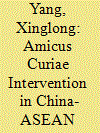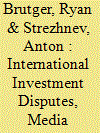| Srl | Item |
| 1 |
ID:
178418


|
|
|
|
|
| Summary/Abstract |
One main criticism levelled against the investor-state dispute settlement system (ISDS) is the existence of limited opportunities for amicus intervention. Against this backdrop, this article firstly studies what reforms regarding amicus intervention in ISDS proceedings have been put forward by China and ASEAN countries and the relevant dilemmas. Subsequently, to ensure that maximum benefits can be realised from amicus participation in ISDS proceedings in China-ASEAN Free Trade Area (CAFTA), this article proposes procedures for when and how an amicus may participate in arbitral proceedings under the upcoming investment agreements, particularly the Regional Comprehensive Economic Partnership (RCEP). Additionally, given the fact that the level of amicus participation in ISDS proceedings is still limited, the article suggests that China and ASEAN need to establish safeguards to provide amici with access to key arbitral documents and oral hearings. However, achieving the above objectives should not come at the expense of undermining the confidential and protected information of both disputing parties.
|
|
|
|
|
|
|
|
|
|
|
|
|
|
|
|
| 2 |
ID:
147639


|
|
|
|
|
| Summary/Abstract |
As part of its economic diplomacy, Australia has directed intense effort into both bilateral and plurilateral trade negotiations such as the Trans-Pacific Partnership. According to then Minister for Trade and Investment Andrew Robb, with no major multilateral trade deal in decades, you have to ‘row your own boat’ or risk missing out. With the fundamentals of trade and the nature of trade negotiations changing, trade liberalisation has become an increasingly sophisticated and difficult negotiating area. A case study of the controversial TPP shows the tensions for a middle power navigating this space. The benefits of the TPP are contested and the government faces criticism of the adverse impacts of the agreement, especially investor-state dispute settlement clauses, impact on human rights and suspicion that the TPP is motivated by geopolitical drivers. In order not to lose more than it gains in moving away from the multilateral trade system, Australia must ensure that trade agreements are consistent with WTO rules and have open and fair accession regimes as a basis for signing. Finally, there is the need for higher levels of transparency and democratic accountability than has historically applied. A new white paper is necessary to make the case for trade liberalisation.
|
|
|
|
|
|
|
|
|
|
|
|
|
|
|
|
| 3 |
ID:
186334


|
|
|
|
|
| Summary/Abstract |
This paper puts forth a theory explaining domestic backlash against international investment law by connecting media coverage—specifically the bias in the news media’s selection of international disputes—to public opinion formation towards international agreements. To test our theory, we examine both the content and effects of the media’s reporting on international disputes, focusing on the increasingly controversial form known as investor-state dispute settlement (ISDS). We find that newspaper outlets in both the United States and Canada have a bias in favor of covering disputes filed against their home country as opposed to those filed by home country firms. Using two national survey experiments fielded in the United States and Canada, we further find that the bias in news story selection has a strong negative effect on attitudes towards ISDS and related agreements, especially among highly nationalistic individuals.
|
|
|
|
|
|
|
|
|
|
|
|
|
|
|
|